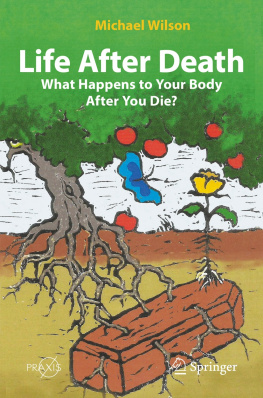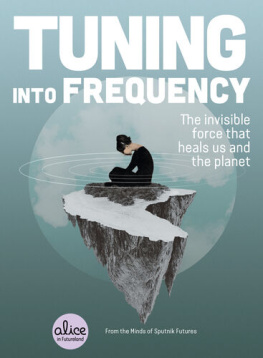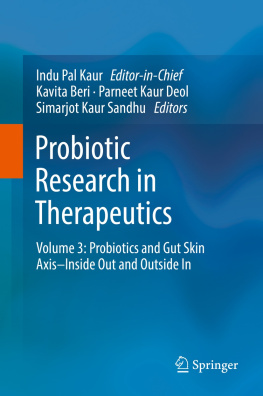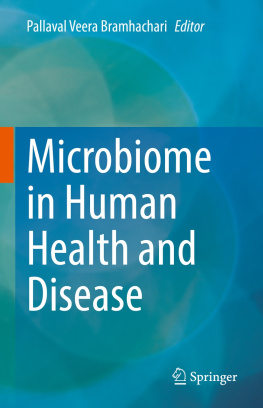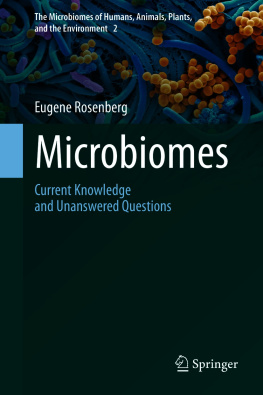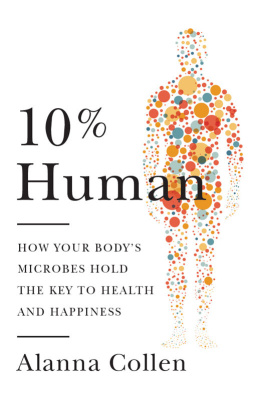Contents
Page List
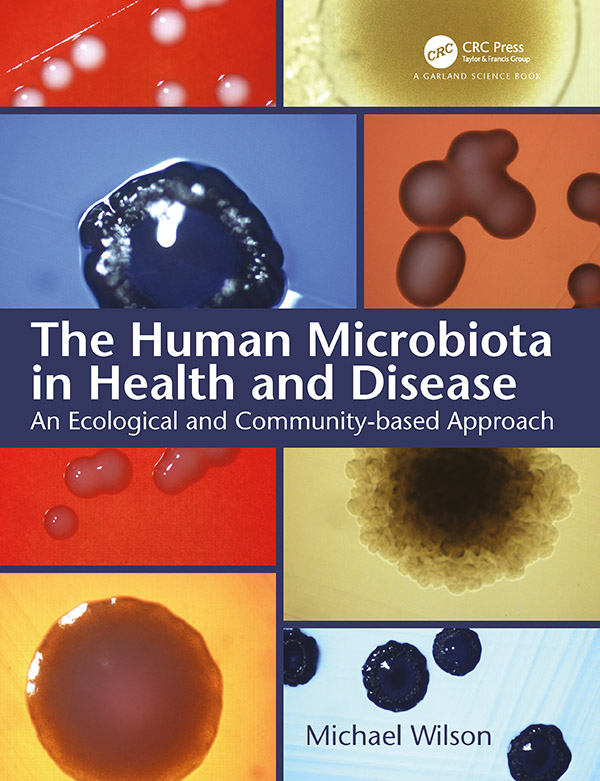
The Human Microbiota in Health and Disease
An Ecological and Community-Based Approach
The Human Microbiota in Health and Disease
An Ecological and Community-Based Approach
Michael Wilson
Cover images credited to Dr. Derren Ready
CRC Press
Taylor & Francis Group
6000 Broken Sound Parkway NW, Suite 300
Boca Raton, FL 33487-2742
2019 by Taylor & Francis Group, LLC
CRC Press is an imprint of Taylor & Francis Group, an Informa business
No claim to original U.S. Government works
Printed on acid-free paper
International Standard Book Number-13: 978-0-8153-4585-5 (Paperback)
This book contains information obtained from authentic and highly regarded sources. While all reasonable efforts have been made to publish reliable data and information, neither the author[s] nor the publisher can accept any legal responsibility or liability for any errors or omissions that may be made. The publishers wish to make clear that any views or opinions expressed in this book by individual editors, authors or contributors are personal to them and do not necessarily reflect the views/opinions of the publishers. The information or guidance contained in this book is intended for use by medical, scientific or health-care professionals and is provided strictly as a supplement to the medical or other professionals own judgement, their knowledge of the patients medical history, relevant manufacturers instructions and the appropriate best practice guidelines. Because of the rapid advances in medical science, any information or advice on dosages, procedures or diagnoses should be independently verified. The reader is strongly urged to consult the relevant national drug formulary and the drug companies and device or material manufacturers printed instructions, and their websites, before administering or utilizing any of the drugs, devices or materials mentioned in this book. This book does not indicate whether a particular treatment is appropriate or suitable for a particular individual. Ultimately it is the sole responsibility of the medical professional to make his or her own professional judgements, so as to advise and treat patients appropriately. The authors and publishers have also attempted to trace the copyright holders of all material reproduced in this publication and apologize to copyright holders if permission to publish in this form has not been obtained. If any copyright material has not been acknowledged please write and let us know so we may rectify in any future reprint.
Except as permitted under U.S. Copyright Law, no part of this book may be reprinted, reproduced, transmitted, or utilized in any form by any electronic, mechanical, or other means, now known or hereafter invented, including photocopying, microfilming, and recording, or in any information storage or retrieval system, without written permission from the publishers.
For permission to photocopy or use material electronically from this work, please access www.copyright.com (http://www.copyright.com/) or contact the Copyright Clearance Center, Inc. (CCC), 222 Rosewood Drive, Danvers, MA 01923, 978-750-8400. CCC is a not-for-profit organization that provides licenses and registration for a variety of users. For organizations that have been granted a photocopy license by the CCC, a separate system of payment has been arranged.
Trademark Notice: Product or corporate names may be trademarks or registered trademarks, and are used only for identification and explanation without intent to infringe.
Library of Congress Cataloging-in-Publication Data
Names: Wilson, Michael, 1947 April 12- author.
Title: The human microbiota in health and disease : an ecological and community-based approach / by Michael Wilson.
Description: Boca Raton, FL : CRC Press, Taylor & Francis Group, 2019. | Includes bibliographical references and index.
Identifiers: LCCN 2018017482| ISBN 9780815345855 (pbk. : alk. paper) | ISBN 9781351068369 (e-book : alk. paper)
Subjects: | MESH: Microbiota--physiology | Dysbiosis--epidemiology
Classification: LCC QR46 | NLM QW 100 | DDC 612.001/579--dc23
LC record available at https://lccn.loc.gov/2018017482
Visit the Taylor & Francis Web site at
http://www.taylorandfrancis.com
and the CRC Press Web site at
http://www.crcpress.com
For Andrew
And his world unseen.
In memory of
What might have been
Contents
The discovery more than three hundred years ago of the presence of tiny animalcules living in our mouths and in our gut was a truly astonishing event. Initially, we can imagine that humanitys prevailing attitude would have been one of suspicion and fear of these unknown creatures who were lurking inside our bodies. Natural responses would have been What are they doing there? and How can we get rid of them? Its not hard to understand why there would have been a feeling of hostility toward these uninvited freeloaders who were being provided with food and warmth and shelter and who, apparently, were not doing anything in return. The formulation and general acceptance of the germ theory of disease, based on the research of Louis Pasteur and Robert Koch in the latter half of the 19th century, would have done nothing to calm these fearsit had now been demonstrated that these animalcules were responsible for many of the life-threatening diseases that had been devastating humanity for millennia. No less a person than the Nobel prize-winning Elie Metchnikoff, often described as being the father of natural immunity, considered the microbes residing in the gut to be responsible for fermentations and putrefaction harmful to the host. Interestingly, his observations on the lives of centenarians in Eastern Europe led him to suggest that the adverse effects of the gut microbiota could be prevented by daily consumption of soured milk prepared by a group of lactic bacteria, or of pure cultures of the Bulgarian bacillus (i.e. Lactobacillus bulgaricus ). In other words, he was the first advocate of probiotics. Animosity toward our microbial companions persisted for a long time, and during the early 20th century many believed that humans would be healthier, and would live longer, if microbes could be eliminated from our bodies.
Once a link between microbes and disease had been established, research efforts inevitably focused on determining which microbes were responsible for the various life-threatening and debilitating infections that afflicted mankind and on developing means of preventing and treating these diseases. Enormous progress in the control and treatment of infectious diseases was made due to improvements in sanitation and hygiene, the discovery of antibiotics, and the implementation of childhood vaccination programs.
Around the time that we had become convinced that the only good microbe is a dead microbe and were becoming confident of our ability to combat infectious diseases, research on germ-free (GF) animals in the late 1950s resulted in some startling revelations. Mammals (mainly mice, rats, and guinea pigs) raised under GF conditions were found to exhibit a number of surprising differences from those raised normally. The differences observed depended largely on the particular species, but, in general, GF animals were found to have a poorly developed immune system, reduced organ size, decreased blood volume, and decreased cardiac output. These findings suggested that the microbes that lived on us were not the freeloaders we had assumed them to be, but were somehow involved in the development and correct functioning of their mammalian host. In the late 1960s, it was shown that our microbial inhabitants protected us from colonization by pathogens, and we now know that, by detoxifying harmful chemicals in our diet, they can also protect us against cancer. Importantly, they also provide us with energy, vitamins, and essential amino acids. More recent research implies that our indigenous microbiota may affect us in a surprising number of additional ways. For example, there is some evidence to suggest that they can also influence our behavior. Far from being a worrying presence in our body, microbes are now recognised as being essential for our development, health, and well-being. We have now come to realize that a human being is a symbiotic association comprised of a huge number of microbial symbionts and their mammalian hostsuch an association is known as a holobiont.


